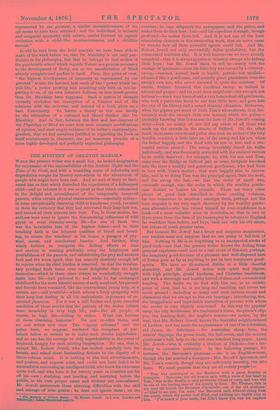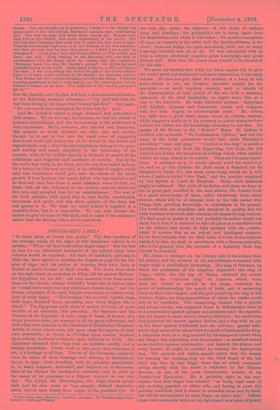THE MYSTERY OF ORLETON MANOR.*
WHEN the present writer was a small boy, he lacked imagination for enjoyment of the impossibilities of the Arabian Nights and the Tales of the Genii, and with a humbling sense of inferiority and degradation sought his literary recreations in the adventures of people who might have been real. And no sort of story so fasci- nated him as that which described the experiences of a kidnapped child—and no interest in it was so great as that which culminated in the delight and astonishment of the temporarily bereaved parents, when certain physical characteristics—especially moles— in some exceptionally charming child or handsome youth, revealed to them the certainty that they had recovered their long-lost son, and turned all their sorrows into joys. For, in those stories, the authors were wont to ignore the demoralising influences of wild gypsy or cruel chimney-sweep life—for one of these two was the invariable fate of the hapless infant—and in their touching faith in the inherent qualities of blood and breed- ing, to return the wanderer to his home, a paragon of phy- sical, moral, and intellectual beauty. And further, they wisely forbore to recognise the dulling effects of time and anxiety in stealing gradually away the brightness and youthfulness of the parents, and substituting the grey and anxious look and the worn spirit, that has scarcely elasticity enough left to rejoice when its chief burden is removed. So that the involun- tary prodigal finds home even more delightful than the faint memories—which in these cases always so wonderfully struggle again into life—had pictured it ; and while he has exchanged childhood for the more blissful season of early manhood, his parents and friends have remained, like the conventional young lady, at a certain age—still youthful—which admits a lively sympathy with their long-lost darling in all his enthusiastic enjoyment of re- covered pleasures. For it was a still further and quite essential condition of these stories that the parents of the stolen infants were invariably in very high life, and—like all people, of course, in high life—rolling in riches. What has become of these charming histories? No one re-edits them, and no one writes new ones. The "agony columns" and the police have, we suppose, rendered the recapture of pur- loined babes so certain as to make such stories improbable ; and no one has the courage to defy improbability in the cause of boyhood, hungry for such stirring biographies. No one, that is, except Mr. Robert Jewell, who has rushed manfully into the breach, and raised these fascinating fictions to the dignity of a three-volume novel. It is nothing to him that advertisements, and posters, and experts exist, and could not have failed to be successful in recoveringan intelligent child, who knew his own name quite well, and who bore it for twenty years in counties not far off his own ; studying, and hunting, and marrying before the public, in his own proper name and without any concealment. Mr. Jewell surmounts these alarming difficulties with the skill and courage of true genius ; he does not ignore them ; on the * The Mystery of Orleton Manor. By Robert Jewell. In 3 vole. London and Edinburgh : Jamee Blackwood and Co.
contrary, he uses diligently the newspapers and the police, and makes them do their best; but—and his expedient is simple, though profound—he makes them fail. And it is not one of the least stimulating elements in this interesting work, that we never cease to wonder how all these powerful agents could fail. And Mr. Robert Jewell not only successfully defies probability, but the consecrated tradition also. It is well known—as we have already remarked—that it is always gypsies or chimney-sweeps who kidnap little boys ; but Mr. Jewell dares to tell us—surely with the courage of ignorance—that his little boy was rescued by a chimney- sweep,—rescued, nursed back to health, petted—not spoiled— educated like a gentleman, and actually given precedence over the sweep's own son, who never resented it, quite the contrary. Of course, fortune favoured this excellent sweep, as indeed is natural and proper ; and his next-door neighbour—the sweep's, not fortune's—was a very learned and a very benevolent old gentleman, who took a particular fancy to our dear little hero, and gave him the run of his library and a sound classical education. Moreover,, when the gipsies got scent of little Tom's whereabouts, they for- timately stole the sweep's little son instead, which the police— probably knowing that it was not the hero of Mr. Jewell's coming story—took no notice of, nor did any other of all those whe made up the crowds in the streets of Salford. On the other hand, these same crowds and police also took no notice of the very forcible conduct, a little later on, of the sweep and his son, when the father happily met the thief with his son in tow, and a suc- cessful rescue ensued. The sweep invariably timed his walks judiciously, and was frequently rewarded with the eminent success he so richly deserved ; for example, he, with his son and Tom, came over the Bridge at Salford just as some footpads knocked into the river a wealthy and generous gentleman, who had been in love with Tom's mother ; they were happily able to recover him, and in so doing Tom was the principal agent, Sam the next, and the sweep the last,—so that the order of merit was, curiously enough, also the order in which the wealthy gentle- man desired to bestow his rewards. There are many other pieces of good - luck described in these exciting volumes, far too numerous to mention ; amongst them, perhaps not the least singular is the very rapid discovery by the wealthy gentle- man aforesaid—who has ruined himself by over-confidence in a bank—of a most valuable mine in Australia, so that in two or three years from the date of his bankruptcy he returns to England far wealthier than before, and buys back not only his old estate, but others of much greater value.
But because Mr. Jewell has a lively and sanguine imagination, our readers must not suppose that we are going to fall foul of him. Nothing in life is so inspiriting as an unexpected stroke of good-luck—not that the present writer knows the feeling from personal exprience—and next to a real event of this sort, perhaps, the imaginary good-fortune of a pleasant and well-disposed here of fiction goes as far as anything to put us into temporary good. spirits. We have no ill-natured dislike to a little cheerful absurdity, and Mr. Jewell writes with spirit and vigour, with high principle, genial kindness, and Christian tenderness, and with a thorough and healthy hatred of sham and conventional humbug. The faults we do find with him are, in an artistic point of view, that he is too long and rambling, and covers too much ground ; including so many and such various scenes and characters that we are apt to lose our bearings ; introducing, too, the braggadocio and improbable narratives of persons with whom the reader is very slightly concerned. In this way the gypsies' camp, the city workhouse, the tradesman's home, the pirate's clip- per, the hunting-field, the angler's resorts—we notice, by the way, that Mr. Robert Jewell knows the beautiful neighbourhood of Ludlow, and has made the acquaintance of one of its celebrities, old Jones, the fisherman — the Australian sheep - farm, the miners' diggings, the green-room, the ball-room, and the country gentleman's hall, help to eke out nine hundred long pages. Again Mr. Jewell—who is evidently a student of Dickens—has a ten- dency to excessive caricature. In the following passage, for instance, the Baroness's grammar— she is an Englishwoman, though she has married a foreigner—Mrs. Revel's ignorance, and Mr. Tom's conceit, though they are sufficiently amusing, run into. farce. We must premise that they are all county people :—
" Tom was introduced to the Baroness with a great flourish of trumpets. • Baroness,' the old woman said, with a wave of her hand to Tom, this is Mr. Seedly, a very particular friend of ours, and who will be one of the leading men of the county in time. Mr. Thomas, this is my very old friend, the Baroness d'Armfulle, one of the old. noblesse: ---‘ Glad to see you, rm sure,' the Baroness said, without rising from the couch, which she pretty well filled, and nodding her double chin at
• him. rve heard of your uncle, but didn't know you was his nephew before. You was brought up in Andraliar, I think ?'—' Mr. Seedly has *pent most of his time abroad, Baroness,' mamma says, interrupting her. 'But now we hope he'll settle down among us.' Mamma then took Tom to the window, and spoke rapturously of his poetry. She told him dear Constance had cried over it until she was quite a sight. "That she herself had wept over it in the solitude of her own chamber, and that she was sure he was very clever.—' I think I am a poet,' he stammered. 'I feel that I have the divine afflatus.'—' I'm certain you have,' she said. Then turning to the Baroness, who was deep in conversation with Mr. Bogey about the coming ball, she continued, 'Baroness, have you seen Mr. Seedly's poems? lie writes the most beautiful poetry in the world. Quite equal to Byron, or Mill, or Cobden, I'm sure. I was just telling him he has the gift of the divine afflatu- ience.'—' I hope you'll cultivate it, 3fr. Seedly,' the Baroness replied. The divine—af—af— what's-his-name, is a very fine thing. I kuowed a young gentleman as had it very highly, and the consequence was he became a colonel in no time. You cultivate it, Mr. Seedly, and you'll get on.'"
But Mr. Jewell's own English will bear a little careful cultivation, as the following sentence witnesses :—" Up until this time she
bad been living in the hopes that Tommy had died." And again, 4' No one would have instigated the crime but her" (sic).
And Mr. Jewell is rather a rough diamond, and sometimes a little coarse. We do not care, for instance, to read the details of personal uncleanliness, and the love-making at the workhouse is very unpleasant. He is, however, also shrewd and humorous.
His remarks on social injustice are often true and caustic, though he is apt to run into the usual error of supposing that moral truth and beauty are to be found in the lowest and
highest ranks only ; that love and helpfulness belong to the poor, and nobility and manly simplicity to the aristocracy of the country, while to the middle-class he is inclined to award all the *elfishness and vulgarity and snobbism of society. But by far the really best thing in the book, and the one that makes us hope for a future for this new novelist, is the subtlety of insight, which
only true tenderness could give, into the causes of the tardy growth of love between the manly fellow who has married a girl he does not care for—from a most mistaken sense of duty, we think, with all due deference to the author—and the worn-out flirt who only accepted him for an establishment. The rest of the book exhibits, with much that is very faulty, considerable cleverness and spirit, but this short episode of the story has
real genius in it. We wish we could collect it together in a quotable form, but it is impossible. We can only entreat the author to give us more of this kind, and to make it the substance rather than the fleeting vision of his next book.



































 Previous page
Previous page